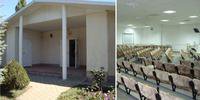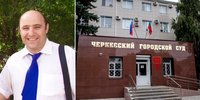Case of Batchaev in Cherkessk
Filter
- #
In Cherkessk, the local FSB conducts 12 searches of Jehovah's Witnesses. Security forces are detaining and interrogating about 10 people. A day later, all the believers, with the exception of Albert Batchaev, were released. A criminal case was opened against Batchaev under Part 1 of Article 282.2 of the Criminal Code of the Russian Federation for organizing "the performance of songs from a special collection of religious teachings of Jehovah's Witnesses and prayers to Jehovah God" and similar actions. Behind the persecution of believers is an FSB investigator, Major of Justice M. Sapronov.
- #
- #
The court leaves Batchaev in a temporary detention facility for another 72 hours. Meanwhile, Albert's acquaintances report that they are under surveillance. One of the believers reported pressure on her minor son — unknown persons harass him and emphatically openly photograph him.
- #
The court extends the arrest of the believer until February 11, 2020. About 25 people come to the meeting to support Albert, which pleasantly surprises relatives who are not Batchaev's fellow believers. He himself is transferred to a pre-trial detention center.
- #
The Supreme Court of Karachay-Cherkessia does not heed the arguments of Albert's defense and rejects the appeal against the believer's detention.
- #
The court releases Albert from custody, changing the measure of restraint from detention to house arrest. Batchaev spent almost two months in prison.
- #
Appeal hearings on the measure of restraint against Batchaev are not completed in his favor. The Supreme Court of Karachay-Cherkessia returns the believer back to the pre-trial detention center, overturning the decision of the previous court, which sent Albert under house arrest. The defense considers the decision unfair and unreasonable.
- #
Judge of the Cherkessk City Court of the Karachay-Cherkess Republic Shukurov N.I. chooses a measure of restraint in the form of house arrest for a period of 2 months - until June 4, 2020 against Albert Batchaev. The punishment provides for certain restrictions, but allows cohabitation with the spouse. The accused shall be released from custody in the courtroom.
Such a decision is made by the court at the request of the senior investigator of the investigative department of the FSB of Russia in the Karachay-Cherkess Republic, R. N. Tazhikenov. The petition for mitigation of the punishment is supported by the prosecution in the person of T. T. Konov.
- #
The Supreme Court of the Karachay-Cherkess Republic is considering an appeal on a measure of restraint. The court leaves him under house arrest. At the same time, Batchaev is now allowed to take two-hour walks (from 7 to 9 in the morning) within a radius of 500 meters from the house. He can also communicate with those who are not involved in this criminal case.
- #
Investigator Tazhikenov issues a decision to bring Albert Batchaev as a defendant in committing a crime under Part 1 of Article 282.2 of the Criminal Code of the Russian Federation.
The believer is accused of having "an advantage in determining the course of worship ... containing statements... about the inducement to break kinship, family and friendships ... refusal of medical intervention ... negative assessment of persons who are not followers of the religious teachings of Jehovah's Witnesses." Batchaev claims that he did not encourage anyone to do anything like that.
- #
According to the indictment, the investigator gathered "sufficient evidence to bring charges." Despite the end of the investigation, the defense has to persistently ensure that the believer is provided with material evidence and copies of the criminal case materials for review.
- #
Referee: Rustam Atayev. Cherkessk City Court of the Karachay-Cherkess Republic (24 Voroshilov St., Cherkessk).
- #
The preliminary hearing is held behind closed doors. The prosecutor insists on extending the measure of restraint against Albert Batchaev, arguing that the accused, "remaining at large and fearing the severity of the punishment, can hide from the court." The believer claims that suffering for the Christian faith is an honor, and the severity of punishment for him is not a reason to hide.
Judge Rustam Atayev extends Batchayev's house arrest for another 6 months, until March 25, 2021. By this date, the total term of restraint will be 368 days. At the moment, the believer has already been under house arrest for six months.
- #
Judge Rustam Atayev, taking the side of the prosecution, refuses to terminate the criminal case, not taking into account the decision of the Council of Ministers of Europe. The document states "serious concerns about the total ban of 2017 ... as a result of this ban, Jehovah's Witnesses continue to be arrested, prosecuted, and imprisoned simply for peacefully expressing their religious beliefs."
Albert reads out his attitude to the charges.
- #
Prosecution witness Piskunov, whose wife, who died in 2018, was one of Jehovah's Witnesses, is being questioned. He cannot say anything specific about the circumstances of the criminal case and cannot even say with certainty whether he has ever seen Albert Batchaev.
Witness Ogareva, who attended Jehovah's Witnesses services in the past and now professes Orthodoxy, answers when asked about the differences between these two confessions: "There [Jehovah's Witnesses] do not hang icons, they are not baptized there, they believe in the resurrection of the dead on earth, Jesus is considered the son of God who came to earth to take sins upon himself." She admits that she does not have the latest information, since in 2013 she stopped communicating with Jehovah's Witnesses. Albert Batchaev expresses complete disagreement with the testimony of the witness Ogareva, stating that he does not know her. He notes that Ogareva did not bring a single fact or evidence of his "guilt".
Another witness for the prosecution, Sereda, among other things, says: "As far as I know, all Jehovah's Witnesses are equal before each other, there is absolutely no headship there, as in Orthodoxy. Elders too, there is no such thing: you are the chief elder, you are the secondary elder."
- #
A court hearing is underway regarding the extension of house arrest. Albert Batchaev describes the circumstances of his family: he and his wife are expecting the birth of a child, his 87-year-old father needs care, the health of the believer himself requires medical attention.
The court takes into account all the circumstances and extends Albert's house arrest until June 25.
- #
Interrogation of prosecution witness Matusevich, who attended religious services for about two years before the ban on legal entities of Jehovah's Witnesses. According to Batchaev, the witness gives false testimony against him.
"I don't know Matusevich, I've never seen him, and he doesn't know me and he's never seen me," Albert explains, "I completely disagree with Matusevich's testimony."
- #
Judge Rustam Atayev, with the participation of prosecutor R. B. Dzyba, decides to soften the measure of restraint for Albert Batchaev. The believer was released in the courtroom on his own recognizance not to leave and proper behavior.
- #
The examination of the material evidence seized during the search of Albert's home continues - old photographs, personal notes and letters of support from friends of the defendant. During the third session, the court reads out excerpts from the letters.
- #
The court is reviewing video recordings of three worship services. Due to technical problems with the sound, Albert explains to the court what is happening at these meetings and what Jehovah's Witnesses believe: "We believe in one God and trust only the message from the Bible, as it is the Word of God." He adds: "Today's Christians, Jehovah's Witnesses, are organized along the lines of first-century C.E. Christians."
- #
The court interrogates a linguist and a religious scholar. When asked whether, in the opinion of the linguist, Jehovah's Witnesses are a legal entity or a community of people, she cannot answer and states that this is beyond her competence.
The defense finds out that the religious scholar does not have a special education. In her conclusion, she relies on the works of anti-cultists A. N. Syrovatkin and A. L. Dvorkin, who criticize the religion of Jehovah's Witnesses. He agrees with the lawyer that it was possible to use the works of recognized religious scholars S. I. Ivanenko, N. S. Gordienko, M. I. Odintsov.
In his conclusion, the religious scholar concludes that Jehovah's Witnesses are trying to circumvent the decision of the Supreme Court by acting as a legal entity. When asked by the lawyer what justified such a statement, the expert replies that this is his personal opinion, and confirms that he has gone beyond his competence.
- #
The court rejects the defense's petition to declare the religious examination inadmissible.
The defendant is being interrogated. Batchaev gives explanations about the accusations against him. He comments on one of the songs: "The lyrics of this song teach me to treat all people with respect, to be merciful, humble, to forgive sincerely from the heart, to show compassion."
He further says: "I am not a representative of the organization of Jehovah's Witnesses, liquidated in the Russian Federation for extremist activities. It may be hard for the prosecution to believe it, but I do not have the status of a legal entity! And in order to believe in God, I don't need any permissions! Through the Bible, God tells how to worship him. And I participated in peaceful worship not at the behest of any organization, but of my own free will."
Regarding the letters of support attached to the case file as physical evidence, Albert explains: "They do not prove that I am some kind of spiritual leader and have great authority among Jehovah's Witnesses. These letters are living proof of sincere and unselfish Christian love."
- #
The prosecutor asks the court to sentence Albert Batchaev to 6 years of real imprisonment and 2 years of restriction of freedom.
Albert Batchaev makes his last word without preparation, as the judge refuses to give extra time for this. The believer manages to read out his appeal to the court only partially, as Judge Rustam Atayev interrupts his speech.
The last word of the defendant Albert Batchaev in Cherkessk - #
About 100 people come to the believer's courthouse to support. Judge Rustam Atayev sentences Batchayev to 6 years of suspended sentence.

